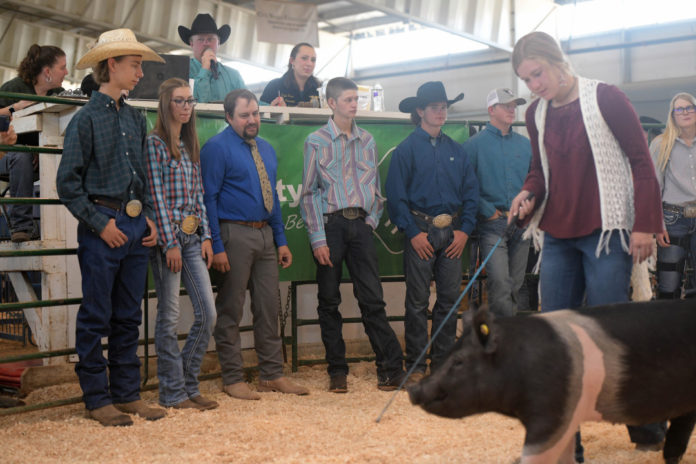HAYDEN — In an eighth-grade health class, in a community surrounded by grazing cattle, chicken farms and fields of spinach, some students had no clue how to make a scrambled egg. A few had never even cracked one into a bowl.
There was a clear division in the class of 13- and 14-year-olds. Some milked cows, collected eggs or tossed hay to their family cattle before they came to school in the mornings, while others were “town kids” — children of coal workers, business owners and employees of the resort hotels and restaurants in nearby Steamboat Springs.
The class — where all students eventually learned to make scrambled eggs, fried eggs, salsa and waffles from scratch — helped motivate Hayden School District and nearby South Routt schools to double down on agriculture. Now, after winning a $1 million grant from the state Department of Education, the districts are infusing agricultural learning into every grade, from preschool to senior year.
The goal is to return to Routt County roots, to connect classroom learning to a way of life long-valued in the rolling hills of northwest Colorado, and, simply, to make sure every student who graduates from Hayden or South Routt knows not just where their food comes from but that their neighbors helped grow it.
Elementary kids will plant seeds and harvest gardens, following a curriculum developed by Colorado State University. Every middle school student will rotate through a class on agriculture, learning to bake bread and grow sprouts. High schoolers will learn to butcher and process meat, or study horticulture in a greenhouse and sell produce at a school farm stand.
Hayden schools will soon have beehives, allowing students wearing protective gear to harvest honey in a commercial kitchen and then sell it. In nearby Oak Creek, the home of South Routt School District, students will learn to cut steaks from a quarter of beef, operate meat grinders to make hamburger and produce cheese and other food products to sell to the community.
And for the first time, Hayden added a Future Farmers of America program this year, giving high school students the option of graduating with a community college certificate in ag science.
“It is a heritage here,” said Christy Sinner, superintendent of Hayden schools. “The town is growing but they also want to keep their traditional values, and one of those values is the farming and the agriculture community.”
Sinner, in her fifth year at Hayden, recalled how students two years ago invited her to come to class to hear the results of a persuasive speech assignment. The kids bombarded her with well-researched arguments about why Hayden needed an FFA program — they would have more passion for learning, would become community leaders and could win college scholarships, they said.
“I was really surprised there wasn’t an FFA program,” said Sinner, noting that the grant made it possible to afford the program in a small district of about 400 students. “That’s what this valley is known for.”
Hayden has a thriving 4-H program, which operates separate from the school district. Club members raise and show animals from rabbits to steers for the county fair and take cooking, sewing and woodworking classes from volunteer teachers. FFA, though, is more of a lifestyle, a comprehensive, education-based program with classes on farming, soil science, land sustainability, food production and sales.
In South Routt, the high school’s FFA chapter dates back to 1963 and multiple students each year, along with their high school diploma, earn an ag science certificate through Colorado Northwestern Community College in Rangely. This year’s juniors in Hayden are the first class eligible to work toward the college certificate, which requires fewer credits than an associate’s degree.
Hayden stepped into ag-infused education last year by offering an Intro to Agriculture class, which ended up being the most popular course on campus, Sinner said. Enrolled students developed their own ag projects, which included kids raising rabbits and goats and one student studying in vitro fertilization of sheep on his family ranch. In some cases, ranch kids offered up space for town kids to keep their animals.
For students considering making a career out of farming or ranching, perhaps continuing operations of a generations-old family ranch, the ag courses “increase pride in what they have to offer,” Sinner said. And for others, the classes will carry through their lives in less-consuming ways, whether it’s in raising backyard gardens or through shopping and cooking, she said.
“It’s being able to take care of yourself,” Sinner said.
As the school year started this week, Hayden is shopping for pots and pans for its commercial kitchen, plus a smoker device used by beekeepers. The community is raising money for a greenhouse, which Sinner hopes is completed “before the snow flies.”
“This beautiful landscape is a working landscape”
For one of the first field trips of the year, Hayden’s agriculture education instructor Eric Wellman plans to take his students to study actual fields. They will learn to identify the natural grasses and plants of the rangeland, to determine whether a field is overgrazed and needs a break, or under-grazed and needs a cattle herd.
In ag science lab, students will use cookies to study how to divy up food for an entire planet. They also will measure double-stuffed Oreos and regular-stuffed Oreos to see whether there is truth in marketing. And they will taste various types of grapes and learn what makes them unique.
Wellman, who grew up on a five-generation sheep and cattle ranch nearby, is new this school year, after spending 10 years in North Park School District in Walden. His goal is to help kids see the connection between life on a ranch and their education. He uses algebra as an example — “Say you’re fencing a yard,” he said. “How much material do you need? The material is the X in the equation.”
His courses are not intended just for farm and ranch kids, however. He expects many will enroll only in one or two ag-based classes throughout their four years of high school, picking up a basic knowledge of hydroponics, vegetable production and land management. “It’s important that we teach young people where their food comes from and how clothing is produced,” he said.

Wellman remembers the divide between the ranch kids and the town kids when he attended Moffat County High School. Now, 15 years later, he believes his lessons will resonate with both groups, particularly since “urban agriculture has taken this great uptick,” he said. City residents are raising a couple of chickens in their backyards, harvesting their own honey and seeking out farm-fresh food.
“People want to be involved,” Wellman said. “They want to be educated about their food.”
Rachel Wattles, a mom of four kids who attend Hayden schools and the district’s former health and wellness coordinator, is the instructor who taught eighth graders how to make fried eggs. She also taught them to tell the difference between garlic and an onion. And how to chop cilantro with a kitchen knife.
While some students in the class were “quite established cooks,” Wattles was surprised by the lack of general knowledge about how to make a meal. Plenty of kids nationwide don’t know their way around the kitchen, but it was more shocking in a farming community.
At the ranch, Wattles’ family selects one of its chickens for a special, once-a-month dinner. Her children harvest raspberries and help their grandma pick grapes. Wattles’ mother-in-law, an avid knitter, raises sheep for their wool.
For a few years, the family ran a farm-stay bed and breakfast, allowing guests to milk their cow and collect eggs from the chicken coop. Last week, Wattles’ kids showed their 4-H animals at the Routt County Fair with dozens of their school classmates who trailered hogs, lambs and steers to the fairgrounds in Hayden.
“Regardless of what you end up doing later on in your life, I think being involved in agriculture creates work ethic, confidence, meaningfulness and appreciation for food and for our heritage and where we are getting our food,” she said. “It lays a connection to the animals, to the land, and also to each other, which I very much saw coming out of fair week.”
Before the agricultural grant, Hayden secured a three-year state health grant for $36,800 per year that allowed the district to focus on nutrition and physical activity. Hayden schools purchased fly-fishing rods and stand-up paddle boards for its physical education classes, and Wattles, along with her healthy cooking class, began organizing a community health fair and a turkey trot race.

The joint Hayden-South Routt agriculture grant comes from Colorado’s RISE program — Response, Innovation and Student Equity — to transform public education. When it was announced by Gov. Jared Polis’ office in January, school leaders called the one-time funds “an investment in the next generation of students who will take the Yampa Valley to and through the unknown future that lies ahead.”
And that future is uncertain.
“Some of the biggest skepticism going into this is from the farming and ranching community, saying there are no careers there,” said Tammie Delaney, who owns a coffee shop in Hayden and is on the school board. “This is the stuff that keeps me up at night. That should be one of the most critical jobs out there, raising great food. That is the very primary essential of life itself.”
Delaney called it a “huge ‘aha!’ moment” for the school board and the town to realize that kids who are not involved in the area’s 4-H culture are disconnected from food, as evidenced in the eighth grade health class.
The grant is linking the land to the education system similar to the way the Community Agriculture Alliance, based in Steamboat Springs, links resorts to ranching, including by connecting restaurants with local food producers, said Delaney, whose family has raised yaks, hogs and lambs.
“This beautiful landscape is a working landscape,” she said, “and the highest and best use of it is keeping it in agriculture.”
“More of the food dollar”
At Soroco High, which stands for South Routt County, grant funds are going toward equipment for a new commercial kitchen — a walk-in cooler, meat grinders, sausage stuffers, a band saw — where students will learn meat cutting and how to make dairy products.
The school also added a second ag teacher and will ramp up course offerings in horticulture, food production, and management of water and land. One new class this year is construction, including framing, plumbing and electrical work.
Hayden students will take field trips to Oak Creek to learn meat and dairy production, and Oak Creek students will visit Hayden’s honey operation. Video technology will also allow students to join courses remotely.

Soroco High senior Jed Kirby, who will graduate next spring and hopes to attend Texas A&M University, intends to use his ag science education to expand the family cattle operation. Already, Kirby helps raise Wagyu beef, high-end cuts from a Japanese breed, and sell it to restaurants and families in the Vail Valley.
But in the future, he wants to run his entire operation, cutting out the middlemen and capturing a higher percentage of the food dollar. For every dollar that food costs, only about 8 cents goes back to agriculture producers, according to his teacher, Jay Whaley. The rest is eaten up by the steps it takes to get the food to someone’s plate — processing, transportation, marketing.
Kirby wants to create a beef operation that includes the whole spectrum. “There is a lot of value in that economically and morally,” the 17-year-old said. “Especially in a rural community, there is an extreme amount of value in saying that since this animal was born, it’s been under my care. It’s been fed the best hay. It’s been treated the best way it could. It was harvested in my facility. I think people care about that these days.”
Whaley, South Routt’s ag education instructor, sees a bigger picture. “If we can teach kids how to capture more of that food dollar, ultimately, that is what is going to keep people producing agriculture products,” he said.
When South Routt’s commercial kitchen is finished, hopefully during spring semester, Whaley’s students will sell their food products out of a storefront on campus. And when they graduate, they will know how to cook for a restaurant or a factory, start a cottage food business selling pies, and how to smoke bacon.
The timing of the grant is perfect, Whaley said, “especially with this push and desire right now of people wanting to know where their food comes from and wanting to buy it locally. The momentum we have with this is perfect timing for the world we live in.”
Only about a quarter of Soroco High’s 100 students live on a farm or ranch, but food matters to everybody, he said. “That’s the paradigm shift I want to hit with this,” Whaley said. “Agriculture hits everyone’s lives somehow, someway.”

The Colorado Sun has no paywall, meaning readers do not have to pay to access stories. We believe vital information needs to be seen by the people impacted, whether it’s a public health crisis, investigative reporting or keeping lawmakers accountable.
This reporting depends on support from readers like you. For just $5/month, you can invest in an informed community.
Credit: Source link






























